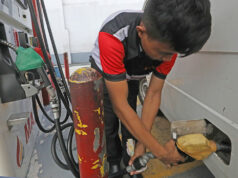
FILIPINO consumers are becoming more aware of how their purchasing power can influence companies and promote products and ways of doing business that they support, a media communications company said, citing the results of a study.
Havas Ortega Group said its study, “Emerging Shifts in Filipino Consumption Mind-sets,” which surveyed 251 respondents, indicates that 93% feel a sense of responsibility in exercising their consumption power.
The shift comes in the context of a boarder movement from being a passive consumer to a so-called prosumer, one who also serves as an advocate for products or ways of doing business.
In a briefing in Makati City, the company’s head of data analytics Philip V. Tiongson said this means “There is going to be a shift which will see us moving from mindless consumption… into what we can only call meaningful consumption,” he said.
He added that this shift in behavior has been influenced by technological changes over the past 15 years which allowed people to find their voice through social media and the Internet.
“Technology has empowered us and emboldened us to speak our minds and take a stand on things that are important to us,” he said.
The report identified six key attitudes that have emerged from the study: seeking personal growth via the products purchased; patronizing only companies whose values they identify with; a preference for local products supporting fellow Filipinos; the favoring of products that minimize their ecological footprint; a renewed focus on functional, utilitarian products; and a peaceful shopping experience.
Mr. Tiongson said companies must start recognizing that there is now a “new Filipino consumer that is emerging…(one) that has new and unprecedented needs.”
The study found that 49% of respondents think they have more influence as consumers than as voters, and that 60% make purchasing decisions based on a producer’s values or political and social activities.
Mr. Tiongson noted certain boycott campaigns against brands, which he considers a recent phenomenon “because consumers are beginning to be more aware of their responsibilities.”
He noted that this amounted to consumers voting with their wallets, which may become standard in the future. — Denise A. Valdez



